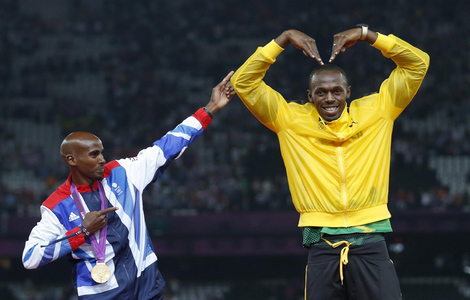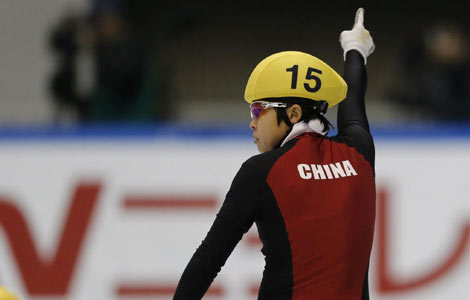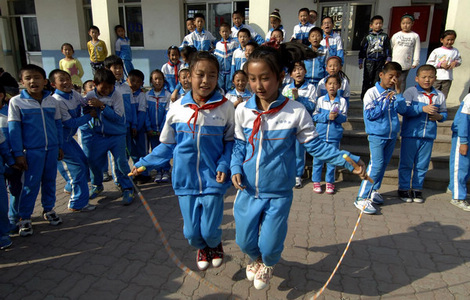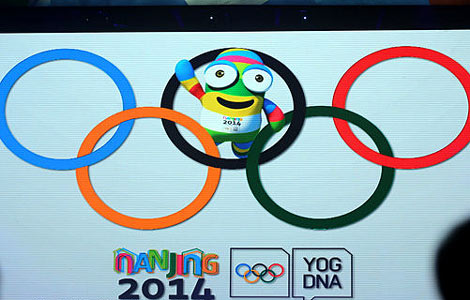
|
Zheng Jie (left) and Peng Shuai made it as far as the quarterfinals of the doubles tournament before getting knocked out. Their exit was the end of China's medal hopes at the London Olympics. Tao Xiyi / Xinhua |


A wildly disappointing Olympics might lead to more bad years for China's tennis
A bad performance in the Olympics can reverberate long after the Games are over.
Tennis' future in China is looking awfully bleak after all three members of the contingent were sent packing early at the All-England Club.
When Zheng Jie and Peng Shuai were knocked out of the doubles quarterfinals on Thursday, it meant nobody had survived past the third round in either the singles or doubles tournament.
Li Na bowed out in the singles opening round, as did Zheng, and Peng was knocked out in the second. Li's doubles run wasn't much better, as she and Zhang Shuai lost in the second round.
China had hoped for at least one Olympic medal to push the fast-growing sport another time, as it did by grabbing gold in 2004 and bronze in 2008.
Instead, it's bringing home nothing but crushed dreams.
After losing to Russian duo Nadia Petrova and Maria Kirilenko, 7-5, 6-7(4), 6-4 in a three-and-a-half-hour match that lasted two days due to a night suspension, Zheng and Peng just couldn't finish off the upset.
They burst into tears in the mixed zone and would barely talk to the media.
"We definitely wouldn't feel so sad if it were just a doubles loss at a pro tournament," Zheng said after spending 40 minutes in the players' lounge with Peng to clear her head.
"If it was at the Wimbledon Championships, we would think: 'Wow, it's not bad; we just lost to a high-ranking seed'. But it's the Olympics, so we wanted it too much."
Zheng has made some history at Wimbledon.
She teamed with Yan Zi to win the doubles title in 2006 - the nation's first major doubles title and, in 2008, she became the first Chinese player to reach the semifinals there.
Li Na reached the quarterfinals in 2008 and 2010.
Along with Li Ting and Sun Tiantian's doubles gold in 2004 and Li's French Open title last year, it all served to inspire the Chinese to become more involved in the game.
The powers-that-be had hoped success in London would spur another burst of growth.
"I had hoped a good result this time would trigger another boom in the sport's professional development in China, as it did the last two times," Chinese tennis chief Sun Jinfang said before the Olympics.
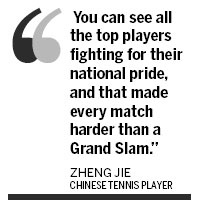
Sun attended the doubles match, cheering Zheng and Peng and getting worked up over controversial calls by the umpires.
The end result left her nearly speechless.
"Just thanks for your support, nothing more," Sun said with a bitter smile to the media before quickly leaving the court.
"She (Sun) actually told us what her ambition was, and I think we indeed need (a medal) as a boost because the sport remains small in China."
Although Li's Roland Garros win drew an enormous TV audience, tennis remains one of China's lesser Olympic programs.
Though Chinese media packed the London Aquatics Center to greet new stars Sun Yang and Ye Shiwen, there was scarcely a Chinese face to be seen in the media room at the All-England Club.
"The tennis heat is only a tiny thing compared with the country's gold-winning thrill at the quadrennial Olympics," said veteran tennis reporter Liu Zhuang of China Central Television.
Although Li, Zheng and Peng all left the State-run system to pursue their professional careers, the game's development still relies heavily on that system and government investment, which is usually linked to the event's Olympic success or lack thereof.
"We remain short of the investment we need to build a foundations in tennis, and it always relates to the results at the Games," Sun told Sohu.com on Friday. "Tennis in China still lags behind the Western countries and is third-class in the world now."
Sun said China has about 1,000 registered tennis players regularly training in the system, despite an increase after she took the helm in 2004.
There are 700,000 active members involved in the sport in the US, according to the United States Tennis Association.
Players have been forced to dig deeper, even sacrifice their health, as they fight to grow the sport in China.
The 26-year-old Peng suffered a right knee injury during the French Open and carried it to the Olympics, where she received treatment during match breaks.
To prepare for the doubles, Peng and Zheng dropped some singles tournaments from their schedule to spend time building chemistry before the Games. They arrived at St George's Hill tennis club near Wimbledon a week early to help them acclimate.
"Playing here, we won't have the prize money or the ranking points. But we want to win every match more than when we are playing on the tour," said Peng, the current world No 29.
The high expectations for the pair became something of a burden, though.
"It's totally different," said Zheng. "You feel the whole country's support behind you, but also the pressure as well. It's been a tougher field than ever. You can see all the top players fighting for their national pride, and that made every match harder than a Grand Slam."
Asked about the 2016 Rio Games, the 29-year-old Zheng said: "I am probably not the one to talk about this (as I might have retired then) - just ask Peng".
Peng will be 30 in four years and she's the youngest top-100 player in China.
"I am looking forward, but four years is too far," she said. "By that time I will be 30. I can't say what I'm going to do. I'm still hoping to play then, but today was tough for us."
sunxiaochen@chinadaily.com.cn
(China Daily 08/04/2012 page7)
